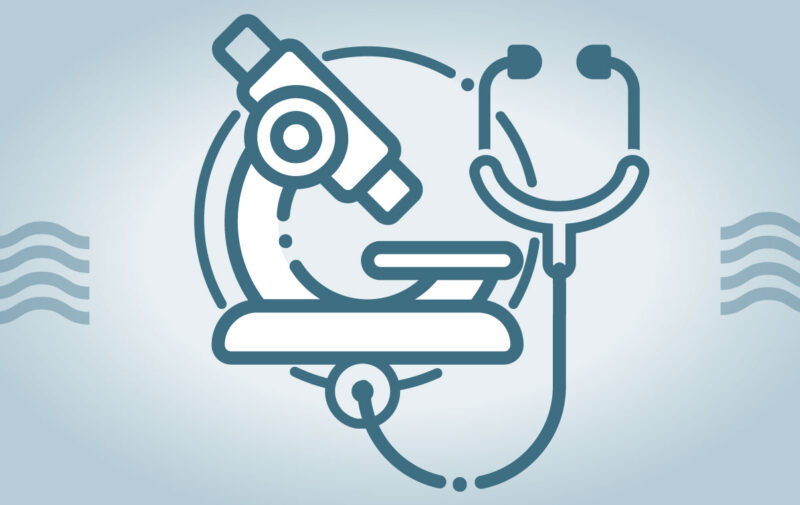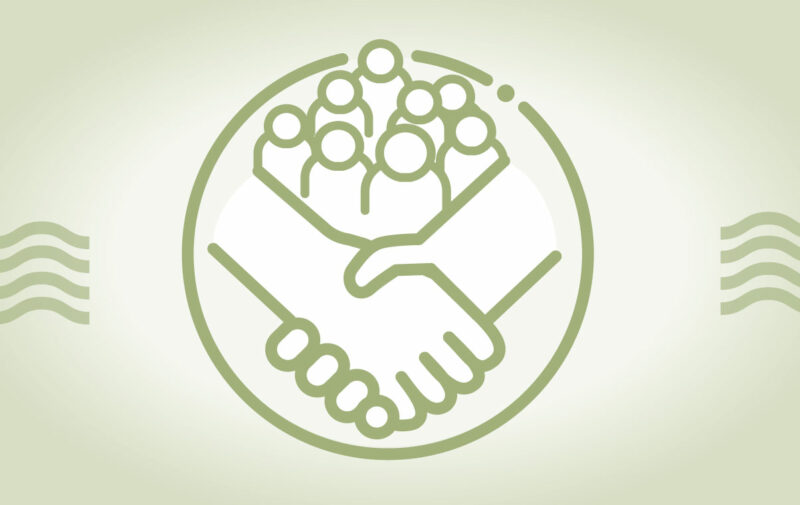
COVID-19 Response Grant
Genetic epidemiology of SARS-CoV-2 in hospitals and care facilities
Year Awarded:
2020
SARS-CoV-2, the virus that causes COVID-19, genetically changes across populations at a predictable rate of one mutation approximately every 15 days. Understanding the transmission of COVID-19 in healthcare facilities, which are at the core of the pandemic in Wisconsin, is crucial to help resolve the directionality and source of infection.
In order to understand if healthcare workers are becoming infected through patient contact, the research team used information such as viral lineage and consensus sequence provided by Oxford Nanopore Technology. The researchers had an initial goal of sequencing ten transmission clusters per month from UW Hospitals and Clinics. They far surpassed this goal and have investigated 55 transmission clusters involving over 400 individuals. After identifying likely and unlikely sources of infection in healthcare workers (HCW) and comparing patient sequences to local outbreaks, they found little evidence for widespread transmission, suggesting that HCWs are most likely to become infected with SARS-CoV-2 in the community.

COVID-19 Response Grant
COVID-19 Response for Milwaukee’s Uninsured Adults
Year Awarded:
2020
This project, led by Bread of Healing Clinic (BOHC), aimed to address and mitigate the impact of COVID-19 on low-income people of color who are uninsured. Early COVID-19 reports revealed significant disparities in its impact, like in Milwaukee where 73 percent of those dying from the virus were African Americans who comprised only 26 percent of the population. For low-income uninsured adults with chronic health conditions, access to ongoing health care, behavioral health care, medications and support in accessing community resources were major factors in managing health and COVID-19 risk.
This project made significant strides in addressing the health care needs of uninsured adults during the COVID-19 pandemic. A telehealth model engaged 14 physicians and facilitated 517 telehealth visits, including specialized care in areas such as nutrition, dermatology and psychiatry. BOHC leveraged tools like Google Suite and “My Health Direct” to enhance data collection, revealing needs in primary and specialty care, diagnostic testing, insurance assistance and housing support. Finally, the project successfully connected 50 patients to free clinics and disseminated COVID-19 safety measures to approximately 1,800 individuals through a number of outreach efforts.

COVID-19 Response Grant
Genetic Surveillance of SARS-CoV-2 Spread in Wisconsin to Inform Outbreak Control
Year Awarded:
2020
This project aimed to genetically characterize SARS-CoV-2 in Wisconsin to estimate infection parameters and evaluate the effectiveness of interventions. In March 2020, little was known regarding the true extent of SARS-CoV-2 transmission in Wisconsin. Researchers used genomic surveillance, tracking of different SARS-CoV-2 strains through space and time, to inform decisions on public health measures and aid the transition between mitigation and containment strategies. Preparing the genetic epidemiology infrastructure was crucial for tracking the local SARS-CoV-2 epidemic through 2020.
The project was successful in understanding and tracking SARS-CoV-2 transmission in Wisconsin. The team utilized genomic surveillance to identify patterns in SARS-CoV-2 transmission and sequenced over 5,000 viral genomes. The establishment of a sequencing program played a vital role during the emergence of the Delta variant, contributing to its early detection in Wisconsin. This project was also one of the first to show that vaccinated people who became infected with Delta variants could transmit the virus to others. Results from this project established a vigorous new research program that attracted significant extramural support, including three new CDC-funded projects using SARS-CoV-2 genome sequences to reveal patterns in virus transmission and evolution.

COVID-19 Response Grant
Safeguarding Fresh Food Access at Farmers Markets to Address Food Insecurity of Vulnerable Populations
Year Awarded:
2020
During the COVID-19 pandemic, the Greater Green Bay community faced increased food insecurity in vulnerable populations. This project aimed to address this challenge by securing additional funds, sustaining farmers markets’ ability to provide nutritious food and piloting a rapid response mechanism. The project successfully achieved its goals by funding the Double Your Bucks (DYB) and expanding it to non-Supplemental Nutrition Assistance Program (SNAP) eligible Hispanic households through the Pandemic Double Your Bucks (P-DYB) program. The project also supported farmers markets in implementing safety measures and innovative approaches to ensure the access to nutritious food. The success of the project led to procurement of additional funding to expand the reach to low-income African American individuals in the future.

COVID-19 Response Grant
Leveraging Personalized Supports for Immediate COVID-19 Response for 4K-12 Students (LPS)
Year Awarded:
2020
When the Madison Metropolitan School District (MMSD) transitioned to virtual learning during the COVID-19 pandemic, their diverse student population, including students with health conditions associated with poor COVID-19 outcomes, lost access to school health services that provide assessments, education, referrals and care coordination. To address this barrier, MMSD implemented a program titled “Leveraging Personal Supports for Immediate COVID-19 Response for 4K-12 Students,” also known as the LPS program. The LPS program aimed to provide immediate support and resources to 2,000 MMSD students with medical conditions from June 2020 to May 2021. Results showed that 356 students and their families received services, with 92 percent requiring one to two support sessions. In addition to addressing physical health needs, the program pivoted to focus on addressing social determinants of health needs such as community resource referrals, food insecurity and housing assistance. The LPS program also provided health and cleaning supplies which helped foster positive relationships between families and staff. Because of these efforts, the LPS program received high satisfaction ratings from both families and staff.

COVID-19 Response Grant
COVID-19 Prevention and Intervention Services for Hmong and Other Refugee Communities
Year Awarded:
2020
Wisconsin is home to the third largest population of Hmong in the U.S., and since the 1990s, it has also been the site of resettlement of tens of thousands of newer refugees from Burma, Laos, Thailand, Cambodia, Tibet and Nepal. These communities experienced significant disparities that were exacerbated during the COVID-19 crisis. Additionally, seniors and parents in these communities were often home-bound, suffer from isolation from their peers, and jobless, while many did not have transportation for medical appointments or grocery shopping.
The Hmong Institute created a collaborative of five local Hmong agencies in Wisconsin to address the immediate needs of Southeast Asian, Burmese, Nepalese, and Tibetan elders and parents who lack access to mainstream services due to language and transportation barriers. The grant team developed a community-based infrastructure to facilitate access to food and other resources for those experiencing disparities in access and need as a result of the COVID-19 pandemic, created and disseminated culturally relevant, multilingual COVID-19 prevention messages and educational resources to ensure timely access to accurate and up-to-date information, and developed and implemented a statewide multilingual COVID-19 Community Hotline to provide information about basic health resources.

COVID-19 Response Grant
Safe and Healthy Schools (SHS)
Year Awarded:
2021
As schools reopened and extracurricular activities resumed in the fall of 2021, it was anticipated that the coming respiratory season would be characterized by numerous respiratory infections, some caused by SARS-CoV-2 and others caused by more typical respiratory viruses including rhinovirus, respiratory syncytial virus, and influenza. Schools needed to develop a strategy to quickly distinguish between cases of COVID-19 caused by SARS-CoV-2 and cases of more typical respiratory viruses. The Department of Health Services in Wisconsin developed testing options for K-12 schools which included the use of BinaxNOW Antigen Self-Tests for individuals with symptoms followed by confirmation through PCR for those who were antigen negative.
The goal of this project was to identify ways to improve upon the statewide testing by comparing the results of repeated at-home antigen tests to at-school PCR tests and evaluating whether oral “lollipop” swabs were as effective as nasal swabs for identifying children with COVID-19. The results of this project suggest that the at-home BinaxNOW test was at least as sensitive as the nasal PCR test. Additionally, lollipop samples performed better than the nasal swabs and were preferred by 92 percent of students.

COVID-19 Response Grant
Lo Que Debes Saber: A COVID-19 Public Health Community Education Strategy for the Latino Community
Year Awarded:
2020
This project, led by Sixteenth Street Community Health Centers (SSCHC), United Community Center (UCC) and the Southside Organizing Committee (SOC), launched a traditional media public health campaign with accurate, up-to-date, culturally-appropriate and literacy-appropriate COVID-19 educational materials and resources for Milwaukee’s Spanish-speaking community. Overall, this project was successful in developing, administering and evaluating a public health communication strategy for slowing the spread of COVID-19 in this community.

COVID-19 Response Grant
Alternative Means to Diagnose COVID-19 Pneumonia
Year Awarded:
2020
COVID-19 presents with non-specific symptoms that are very similar to other viral illnesses, making it difficult to clinically diagnose. Early in the pandemic, polymerase chain reaction (RT-PCR) testing and x-ray computed tomography (CT) were the primary methods of diagnosis, but they lacked effectiveness. The goal of this project was to develop and deploy an artificial intelligence (AI) solution to assist physicians in achieving rapid and efficient diagnosis of COVID-19 using chest x-ray radiography (CXR).
Researchers were successful in curating a large COVID CXR dataset and ultimately developed an artificial intelligence (AI) solution that could differentiate between COVID-19 pneumonia and non-COVID-19 pneumonia with high sensitivity and specificity. In the future, this dataset will be used to address key challenges in AI including generalizability, interpretability, and algorithmic bias.

COVID-19 Response Grant
Barron County Integrated Response to Slow Community Spread of COVID-19
Year Awarded:
2020
Community health workers in Barron County worked to mitigate the impact of COVID-19 on Somali and Hispanic residents in the county through innovative outreach methods and community-focused education efforts. Due to a lack of accurate, culturally-appropriate COVID-19 information in Somali and Spanish, community health workers sought to inform residents about health and safety measures to slow the community spread of COVID-19, as well as promote the importance of the vaccine.
Community health workers in Barron County successfully reduced community spread of COVID-19 and promoted the vaccine with outreach and education to non-English speaking residents who face disparities in local care and kept minority populations as informed and updated during the pandemic as the English-speaking population. The grant team helped keep outbreaks in these communities at the same level or lower than the majority population and identified households that fell below or near the federal poverty level to ensure that they had all the necessary essentials to remain in quarantine provided and reduce spread in the communities. The grant team also contributed to the equal or higher vaccination rates in the county’s Hispanic population.